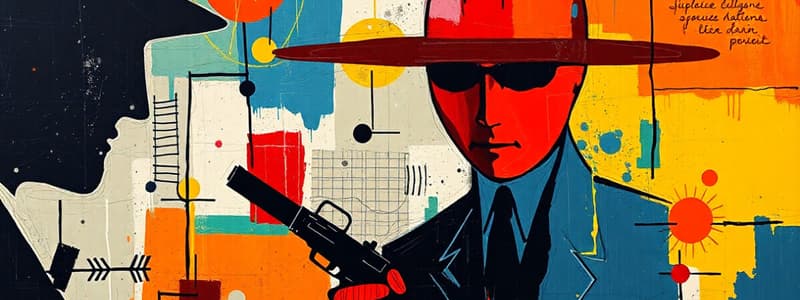Podcast
Questions and Answers
What kind of people were initially chosen as spies by the Office of Strategic Services?
What kind of people were initially chosen as spies by the Office of Strategic Services?
Librarians, professors, and researchers
Which of the following were instructors at SOE training schools?
Which of the following were instructors at SOE training schools?
- A lawyer
- An actor
- An army engineer
- All of the above (correct)
The school’s first explosives instructor was a former spy.
The school’s first explosives instructor was a former spy.
False (B)
Nora Inayat Khan was the only uncaptured radio operator in all of ______.
Nora Inayat Khan was the only uncaptured radio operator in all of ______.
What are L pills?
What are L pills?
What type of novels were available to SOE students for leisure reading?
What type of novels were available to SOE students for leisure reading?
What did instructors emphasize about spy behavior compared to fiction?
What did instructors emphasize about spy behavior compared to fiction?
What was a suggested method for spies to gather intel without raising suspicion?
What was a suggested method for spies to gather intel without raising suspicion?
Women agents were discouraged from acting as couriers.
Women agents were discouraged from acting as couriers.
Women faced no danger of getting caught in a ______.
Women faced no danger of getting caught in a ______.
What was one notable characteristic of a successful courier mentioned in the text?
What was one notable characteristic of a successful courier mentioned in the text?
Flashcards are hidden until you start studying
Study Notes
The Reality of Espionage
- Common stereotype of spies as muscular, gadget-wielding figures is inaccurate.
- In WWII, the Office of Strategic Services (OSS), the precursor to the CIA, recruited largely from academia, utilizing librarians, professors, and researchers.
Training and Skills
- OSS agents excelled in gathering intelligence from extensive documentation and archival sources.
- The Special Operations Executive (SOE) in Britain provided training, using instructors experienced in various fields rather than only defense-related roles.
- Notable instructors included:
- Bill Cumper, an army engineer, taught explosives.
- Paul Dehn, a reporter and film critic, focused on propaganda techniques.
- Ralph Vibert, a lawyer, advised on interrogation.
- Peter Folis, an actor, instructed on cover stories and disguises.
- Nobby Clark, a wilderness survival expert, taught poaching techniques applicable to espionage.
The Brutal Reality of Espionage
- Fiction often downplays the dangers spies faced; many agents suffered gruesome fates in WWII.
- Agents like Nora Inayat Khan and Vera Leigh endured extreme violence upon capture, highlighting the perilous nature of their work.
- Approximately fifty percent of female SOE agents in France did not survive, with many deaths characterized by cruelty unimaginable in fiction.
Survival Strategies and Cover
- Agents often carried suicide pills to avoid capture, reflecting the serious risks of being caught.
- Spies are trained to blend in with the public and to use everyday items creatively for defense or deception.
- Example methods include creating cover stories around benign activities while engaged in espionage.
Operational Techniques
- Training emphasized the stark contrast between the fictional portrayal of spies and reality.
- Effective passphrases should sound like common banter to avoid drawing suspicion, exemplifying practical subversion of expectations.
- Building a network of informants was essential; informants could be unsuspecting civilians like café staff or nearby shopkeepers.
- Subtlety in inquiry was necessary, employing casual conversation or misinformation to elicit useful information without detection.
Role of Women in Espionage
- Women were frequently used as couriers due to their lower profile and lack of suspicion from enemy forces.
- The ability to carry large, concealing packages (like radios hidden under vegetables) facilitated covert operations.
- Female operatives like Maureen O'Sullivan navigated risky situations with confidence, demonstrating the unique circumstances women faced and their effective roles in espionage activities.
Studying That Suits You
Use AI to generate personalized quizzes and flashcards to suit your learning preferences.




